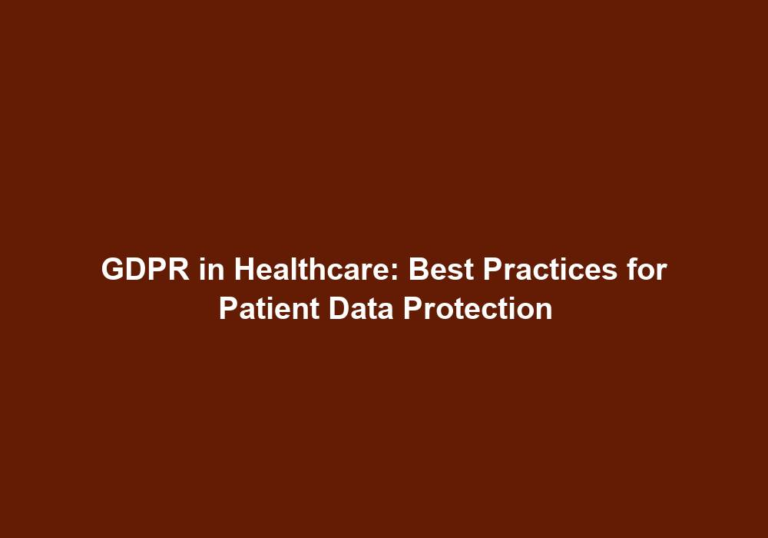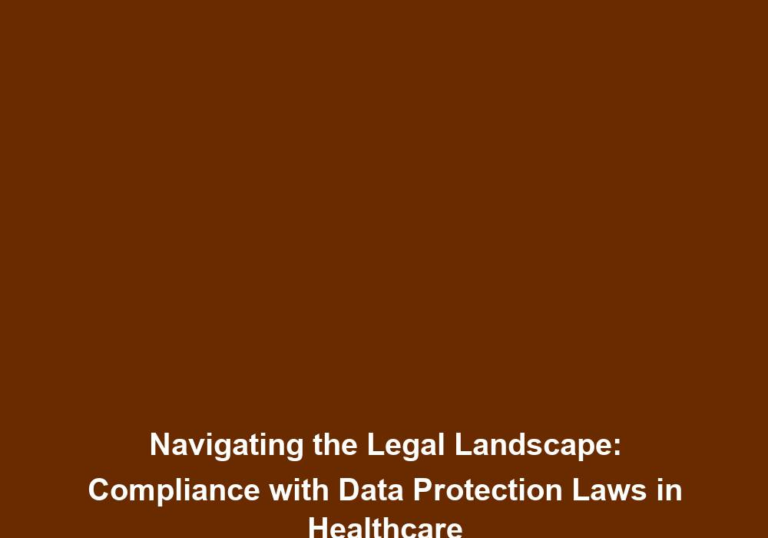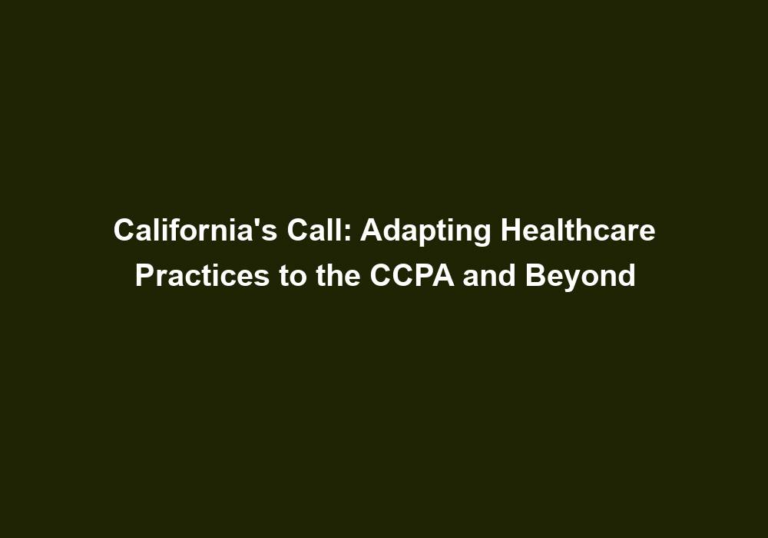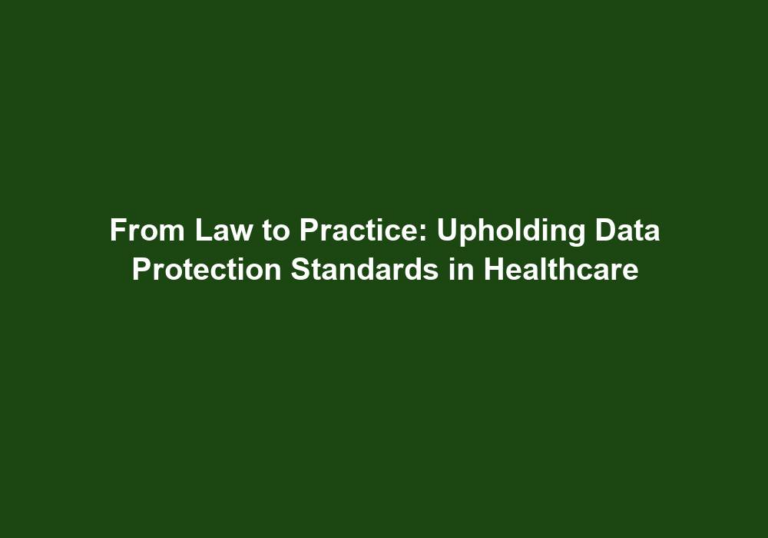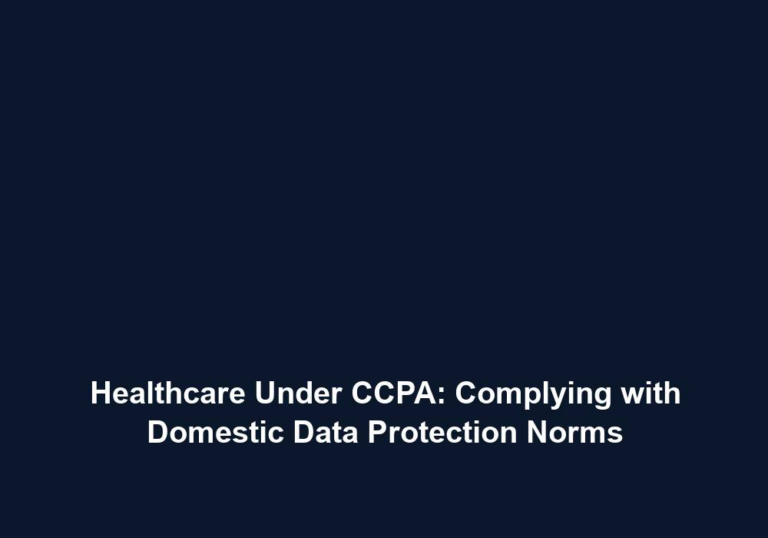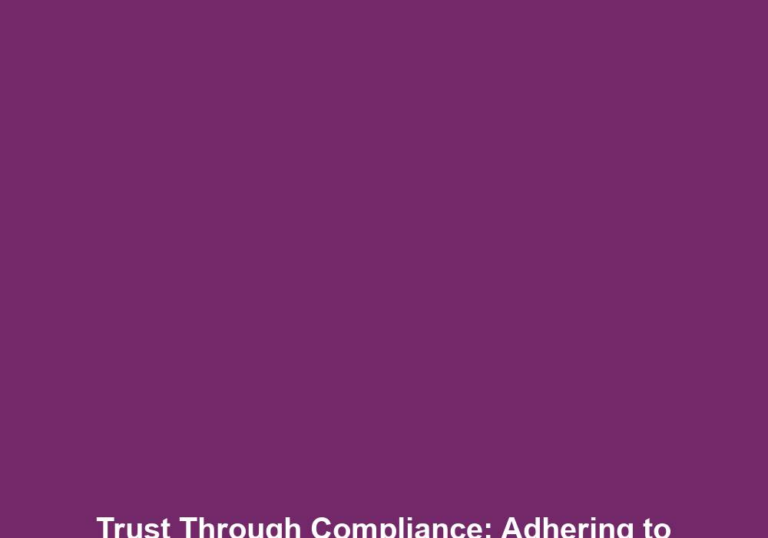Beyond Borders: Navigating CCPA and Other Domestic Regulations in Healthcare
In today’s digital age, the healthcare industry has become increasingly reliant on technology and data to provide efficient and effective patient care. However, with the rise of data breaches and privacy concerns, governments around the world have implemented regulations to protect consumers’ personal information. One such regulation that has had a significant impact on healthcare organizations operating within the state of California is the California Consumer Privacy Act (CCPA). This article aims to explore the challenges and strategies for navigating CCPA and other domestic regulations in the healthcare sector.
Understanding CCPA and Its Implications
The California Consumer Privacy Act (CCPA) is a state-level privacy law that gives California residents greater control over their personal information. It requires businesses to be transparent about the data they collect, how it is used, and with whom it is shared. The CCPA grants consumers the right to know what personal information is being collected and to opt-out of the sale of their data. It also provides individuals with the ability to access and delete their personal information held by businesses.
For healthcare organizations, complying with CCPA can be particularly challenging due to the sensitive nature of patient data. The law applies not only to healthcare providers but also to any business that collects personal information of California residents, including healthcare technology vendors and insurers. Organizations must implement security measures to protect patient data while also ensuring compliance with CCPA regulations.
Key Considerations for Healthcare Organizations
To navigate CCPA and other domestic regulations in the healthcare industry, organizations need to consider the following key aspects:
- Data Governance and Management
Healthcare organizations must establish robust data governance and management frameworks to comply with regulations like CCPA. This involves identifying and documenting the types of personal information collected, the purposes for which it is used, and the entities with whom it is shared. Implementing data classification and mapping techniques can help organizations gain visibility into their data ecosystem and ensure compliance.
- Consent Management
Under CCPA, organizations must obtain explicit consent from individuals before collecting and using their personal data. Healthcare organizations need to develop clear consent management processes that capture and record consent at the point of data collection. This includes providing individuals with accessible privacy policies, consent forms, and mechanisms to withdraw consent if desired.
- Data Security and Breach Response
Protecting patient data is paramount for healthcare organizations. Implementing robust data security measures, such as encryption, access controls, and regular security assessments, can help prevent unauthorized access and data breaches. In the event of a breach, organizations must have a well-defined incident response plan to promptly address and mitigate the impact of the breach. Regular security audits and vulnerability assessments can help identify any weaknesses in the system and allow for timely remediation.
- Employee Training and Awareness
Compliance with regulations like CCPA requires the active involvement and understanding of employees. Healthcare organizations should provide comprehensive training programs to educate employees about data privacy and security practices. Regular training sessions and awareness campaigns can help ensure that employees comply with regulations and understand the importance of protecting patient data. Additionally, organizations should establish clear protocols and guidelines for employees to follow when handling sensitive patient information.
- Vendor Management
Healthcare organizations often work with third-party vendors and service providers who may have access to patient data. It is essential to conduct thorough due diligence when selecting vendors to ensure they have appropriate security measures in place and comply with applicable regulations. Maintaining clear contracts and agreements that outline data protection responsibilities is crucial to managing vendor relationships effectively. Regularly monitoring vendor compliance and conducting audits can help mitigate the risks associated with data sharing and ensure adherence to regulations.
Navigating Other Domestic Regulations
In addition to CCPA, healthcare organizations must also navigate other domestic regulations that impact data privacy and security. Some of the prominent regulations include the Health Insurance Portability and Accountability Act (HIPAA) and the General Data Protection Regulation (GDPR) in the European Union. While CCPA is specific to California, HIPAA and GDPR have broader geographical scopes.
To effectively manage compliance with multiple regulations, healthcare organizations can adopt the following strategies:
- Conduct Regulatory Gap Analysis
Conducting a regulatory gap analysis helps identify the gaps between current practices and regulatory requirements. By conducting a comprehensive assessment of existing policies, procedures, and technical controls, healthcare organizations can determine areas that need improvement to comply with various regulations. This analysis will help prioritize compliance efforts and allocate resources efficiently.
- Establish a Privacy Program Office
Creating a dedicated Privacy Program Office (PPO) can streamline compliance efforts and ensure consistent adherence to regulations. The PPO can be responsible for developing privacy policies, conducting risk assessments, providing ongoing training, and monitoring compliance with various regulations. This centralized approach helps healthcare organizations stay up to date with evolving regulatory requirements and ensures a coordinated response to privacy and security issues.
- Collaborate with Legal and Compliance Teams
Healthcare organizations should establish strong partnerships between their legal, compliance, and IT teams to navigate domestic regulations effectively. Regular collaboration and communication ensure that legal and compliance requirements are understood and effectively translated into technical controls and operational processes. Having a multidisciplinary team can help address complex regulatory challenges and ensure a holistic approach to compliance.
- Regular Auditing and Monitoring
Regular auditing and monitoring of data privacy and security practices are essential to identify and address any potential compliance gaps. Conducting internal and external audits can help healthcare organizations assess their level of compliance and implement corrective actions if needed. Continuous monitoring of systems and processes can help identify any deviations from established policies and ensure prompt remediation.
Conclusion
Navigating CCPA and other domestic regulations in the healthcare industry is a complex task that requires a comprehensive understanding of privacy and security requirements. Healthcare organizations must prioritize data governance, consent management, data security, employee training, and vendor management to ensure compliance. By adopting a proactive and strategic approach, organizations can successfully navigate these regulations and protect the sensitive personal information of their patients.


